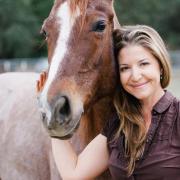
The root of the word discipline comes from discipulus which means learner or pupil.
Understanding Discipline and What it Really Means
The root of the word discipline comes from discipulus which means learner or pupil. At one point humans understood that discipline was actually about learning and not so much about punishment. In the horse (and human) herd, discipline is a loving and protective act. Teaching our youngsters how to survive and thrive in the herd is the most caring thing we can do for them. Teaching others how we wish to be treated helps them to understand who we are, what we like, what we don’t like, and how best to relate with us to have a healthy and peaceful relationship.
We need peace in our herd because we need our collective unit. It’s more obvious in family situations, but at work our team is our “work family” and we need each other there too! We have to learn from each other. And it takes discipline.
Boundaries, feedback, communication, and structure are all behaviors that fall under the category of discipline. Whether interacting with a boss or a direct report, all relationships need discipline. We have to communicate and learn from each other in order to have a healthy culture or community. When we think about it from a survival standpoint and see those harder parts of relationships as loving and caring, it can make it easier to do that heavy lifting. Consider that discipline is truly about learning.
We can teach our colleagues the same way we teach our children: with love and because it matters. In thinking about leadership positions at work, consider yourself a mentor to those around you. Lead by example and inspire others to want to learn from you. Wisdom, grace, and stability are huge attractors. The regal members of horse and human herds command respect just by way of being comfortable in their own skin.
As a parent, keeping your cool in times of stress and not being pulled into others’ drama can make or break your leadership. Just imagine a toddler throwing themself on the ground in a tantrum. The parent who is able to breathe and stay balanced during this episode will likely be able to efficiently guide the child through their difficult emotions.
This couldn’t be truer in a workplace setting. The more we focus on our emotional leadership, the more groups will cluster around us for safety and peace. As herd animals, we can feel the stability of a healthy nervous system and we will gravitate toward it to regulate ourselves.
Most of all, be real with both the kids and adults in your life. Children love a parent who is willing to admit she’s wrong, who will share stories of mistakes and failures, who is vulnerable and open. Adults love this kind of genuineness too. Authentic leadership isn’t about portraying some polished version of our humanness. It’s about a willingness to be tuned in to the reality of any given moment and to respond to it with clarity and as much calmness and reason as possible.



The views and opinions expressed in this post are those of the author(s) and do not necessarily reflect those of MomsRising.org.
MomsRising.org strongly encourages our readers to post comments in response to blog posts. We value diversity of opinions and perspectives. Our goals for this space are to be educational, thought-provoking, and respectful. So we actively moderate comments and we reserve the right to edit or remove comments that undermine these goals. Thanks!